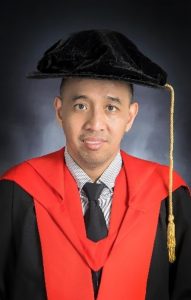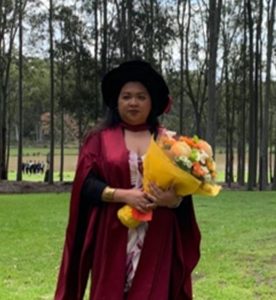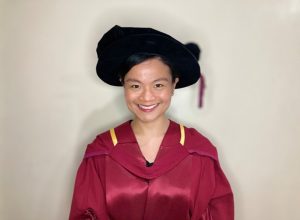An academic lecture was organized by the Faculty of Arts and Letters where the three faculty members who have recently earned their Ph.D. degrees as Graduates of Offshore Programs delivered research papers on the Zoom platform on September 25, 2021.



Spearheaded by the Dean’s Office, with the support of the Department of Philosophy, Department of English Language Studies, and the Journalism Program, the webinar featured the faculty members’ Doctoral research outputs and their academic journey in completing degrees in Australia.
Dr. Darlene Demandante, who graduated from the Macquarie University, delivered her lecture on “Thinking of Politics as Political Subjectivation.”
Demandante presented her dissertation on the notion of political subjectivity using the work of Jacques Rancière, a contemporary political philosopher. Anchoring her research question on Rancière’s work, Demandante attempted to show that the way Rancière conceptualized his notion of political subjectivity, including its hesitations, provides invaluable material for reflection on how we should understand politics at present and on how we should think of our specific roles as political subjects. Demandante’s lecture concludes by suggesting a reading of Rancière that is focused on the “experiences” of the subject of politics.
Dr. Pia Patricia Tenedero, who earned a degree in Linguistics from Macquarie University, discussed “Challenging Language and Academic Myths: Gems from My Ph.D. Journey.”
Tenedero expounded that doing a Ph.D. involves questioning ideologies that people consider common sense or simply take at face value, like the ‘publish or perish’ discourse in academia and favoring English as the only language that matters in global professional communication. She added that many of these discourses that are often reproduced in institutional interactions are, in fact, myths and mere social constructs that need to be challenged, especially when they are cultivating a toxic culture of competition and perpetuating stereotypes.
Catching the attention of the audience was Tenedero’s emphasis on the responsibility of the researcher. She shared that it is a researcher’s moral responsibility to share the new knowledge discovered, but publication in high-impact journals is not the only way. An important question to ask is: “Who needs to benefit from this knowledge?” Then share that knowledge creatively to make sure that it is accessible to those it attempts to help.
In his lecture on “Overseas Remittances and Rural Hometown Investing: In Lands of Green, Harvests Come Across Seas,” Dr. Jeremaiah Opiniano, who obtained a degree in Human Geography from the University of Adelaide, spoke of his Ph.D. thesis on luring overseas remittances for the development of the rural hometowns of overseas Filipinos.
Covering the municipalities of San Nicolas (Ilocos Norte) and Moncada (Tarlac), Opiniano said using remittances for savings and investment hinges on what the communities and financial institutions have to offer locally as well as financial relationships within families having overseas-based breadwinners.
Opiniano, who was recently appointed as the Assistant Director of the Research Center for Social Sciences and Education, also inspired the audience with his story of resiliency and courage in earning his degree amidst the challenge of the pandemic.
The webinar, which was part of the Quasquicentennial anniversary of the Faculty of Arts and Letters, was attended by its faculty members and students in their senior year under the Philosophy, English Language Studies, and Journalism programs.




